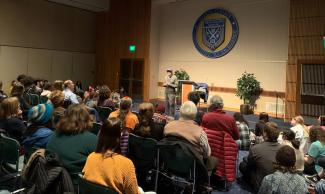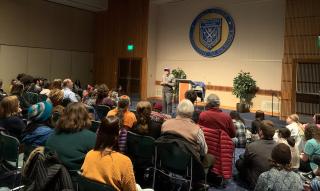Samuel Rind was just two years old when the Second World War broke out in September 1939. Shortly after, when the Germans invaded Poland, his family fled their hometown, living in various ghettos and forced labor camps.
“We made many stops,” said Rind. “But then we got caught, we got put in the back of a truck, and taken to a concentration camp.”
Rind was talking to a room of close to 200 students, faculty, and staff in Ithaca College’s Emerson Suites on February 1. An animated and lively speaker, Rind has been sharing his personal experiences as a Holocaust survivor for a quarter century.
“I want to speak to the entire world. I want to speak to those who are interested and to those who don't give a hoot,” he said prior to the event.
“I am Jewish, and growing up, I heard a lot of survivor stories through my synagogue, but I haven't heard one in a few years. I always want to take advantage of these opportunities, because each story is so unique and important.” said E.G. Wusinich ’27, who remarked that he was impressed by Rind’s passion, forthrightness, and fighting spirit. “I was crying during it.”


